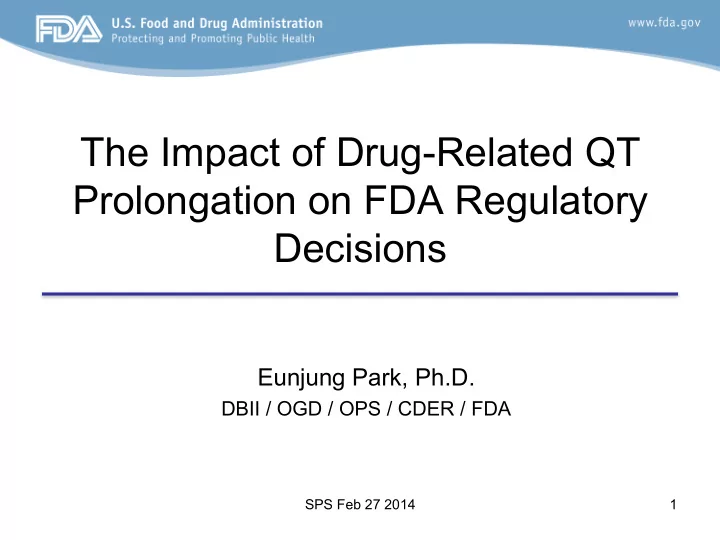

The Impact of Drug-Related QT Prolongation on FDA Regulatory Decisions Eunjung Park, Ph.D. DBII / OGD / OPS / CDER / FDA SPS Feb 27 2014 1
Regulatory Background • Regulatory actions to QT-related cardiac proarrhythmia – Withdrawals of high profile drugs from market: Torsades de pointes (TdP) Drug Indication Year Major Safety Concern withdrawn Terodiline Urinary Incontinence 1991 QTc prolongation, TdP Sparfloxacin Antibiotic 1996 QTc prolongation Terfenadine Antihistamine 1998 QTc prolongation, TdP Astemizole Antihistamine 1999 QTc prolongation, TdP Grepafloxacin Antibiotic 1999 QTc prolongation, Cardiac arrhythmias Cisapride Gastroesophageal reflux 2000 QTc prolongation, Cardiac arrhythmias Droperidol Schizophrenia 2001 QTc prolongation, TdP 2
ICH Guidelines • E14: Human Thorough QT/QTc (TQT) study – Signed in 2005 – An examination of a drug’s QT/QTc prolongation liability – Expensive and intensive study • S7B: Non-clinical cardiac safety pharmacology – Signed in 2005 – hERG channel – Action potential duration (APD) 3 – Non-clinical ECG study
Scope of ICH E14 • New drugs having systemic bioavailability – Exemption • highly localized distribution/ topically administered/ not absorbed • arrhythmias control drug • Approved drugs with – new dose – new route of administration – new indication – new patient population • Drug or members of its chemical or pharmacological class have been associated with QT/QTc interval prolongation, TdP or sudden cardiac death during post-marketing surveillance. 4
FDA Efforts • IRT-QT review team – Interdisciplinary review team for QT evaluation – Systematic QT data analysis, archiving and reporting to streamline the review process and allow for a consistent evaluation and process. – Reviewing protocols and study reports related to QT assessment across all review divisions. • > 200 NDAs reviewed through 2013 • No drug withdrawn for QT-related proarrhythmia since implementation of ICH E14 and S7B 5
Sponsor’s Concerns • Cardiac safety liabilities – Delays in drug development – Labeling restrictions – Negative impacts on physician’s prescribing preferences • NDA submission of QT prolongers has been reduced. • E14 and S7B may bias lead candidate selection and therefore, eliminate potentially useful drugs and reduced patient benefit. 6
Dataset of QT Prolongers • E14 guidance – Upper bound of the 95% one-sided confidence interval (CI) or 90% two-sided CI for the �� QTc > 10 msec. • QT prolonger dataset – 46 drugs • 22% of NDAs in the IRT database • 34 TQT studies • 12 Non-TQT studies 7
Approval Status – QT prolongers Number of Drugs (N=46) Approval Status 41 Approved (89%) 4 Complete Response (CR) 1 large dose-dependent QTc increase and sudden cardiac death in the study 3 marginal or questionable efficacy 1 Withdrawn How about non-QT prolongers in the IRT database? 77% 8
QT Effect Size of Approved Drugs (n=46) 70 60 �� QTc (max) 50 40 30 20 10 0 1 2 3 4 5 6 7 8 9 10 11 12 13 14 15 16 17 18 19 20 21 22 23 24 25 26 27 28 29 30 31 32 33 34 35 36 37 38 39 40 41 42 43 44 45 46 drug Category of �� �� QTc < 10 ms 10-20 ms > 20 ms Number of drugs 12 22 12 Approval % 83 95 83 9
Labeling No of Drugs Mean �� �� QTc (ms) QT-related boxed 3 40 warning Contraindication 5 18 Warnings and 25 16 Precautions Adverse events Drug-Drug Interaction 8 11 Overdosage Pharmacology 10
Drugs in FDA Review Divisions Division Number of QT prolongers (n=46) Anesthesia, Analgesia, and Addiction 2 Anti-infective 5 Antiviral 3 Cardiovascular and Renal 2 Gastroenterology and inborn errors 2 Hematology 3 (1) Medical imaging 1 Neurological 4 Oncology 11 (13 for antitumor) Psychiatry 10 Reproductive and Urologic 2 Transplant and Ophthalmology 1 11
Antitumor Drugs (n=13) Characteristics Number of Drugs Approval 13 (100%) Approval year � E14 3 QT Study (%) 5 (45%) Mean � ( � )QTc (ms) 17.2 Label Boxed Warning 3 Warning and Precaution 9 Pharmacology 1 12
Examples: Toremifene • Indication: treatment of metastatic breast cancer • QT prolongation: 65 ms at 300 mg • Boxed warning: QT prolongation and TdP – Toremifene should not be prescribed to patients with congenital/acquired QT prolongation, uncorrected hypokalemia or hypomagnesemia. • High proarrhythmic risk can be outweighed by therapeutic benefit in regulatory decisions • Non-clinical study results – hERG (+), APD (-), Animal ECG (+) 13
Psychiatric Drugs (n=10) Characteristics Number of Drugs Approval 8 (80 %) Approval year � E14 3 QT Study (%) 5 (50 %) Mean � ( � )QTc (ms) 15.7 Label Boxed Warning 0 Contraindication 1 Warning and Precaution 5 Pharmacology 1 Overdosage 1 14
Conclusions • Eighty-nine % of QT prolongers were approved. • Magnitude of QT effects for approved drugs was large. • QT prolongers with a mean effect of less than 10 ms were labeled with either no or a minimum safety warning in the FDA labeling. • Three drugs with large QT effects and adverse clinical outcomes were approved. • FDA approvals are made on the basis of risk-benefit calculations related to the underlying disease. 15
Questions? 16
References • Gobburu et al, Creation of a Knowledge Management System for QT Analyses, Journal of Clinical Pharmacology 51, 1035, 2013 17
QT interval, a biomarker of TdP Heart’s electrical cycle TQT Study design Baseline Test day Drug Administer QTc 1 QTc 2 Baseline Test day Placebo Administer QTc 3 QTC 4 time QTc = heart rate corrected QT interval Baseline and time matched QTc � QTcF (Fridericia) = QT/RR 1/3 �� QTc = (QTc 2 - QTc 1 ) - (QTc 4 - QTc 3 ) �� � QTcB (Bazett) = QT/RR 1/2 � QTc = QTc 2 - QTc 4 � QTcI (individually corrected) 18 � RR= 60/HR
Oncology Drugs (n=11) Characteristics Number of Drugs Approval 11 (100%) Approval year � E14 3 QT Study (%) 5 (45%) Mean � ( � )QTc (ms) 23.3 Label Boxed Warning 2 Warning and Precaution 8 Pharmacology 1 19
Recommend
More recommend